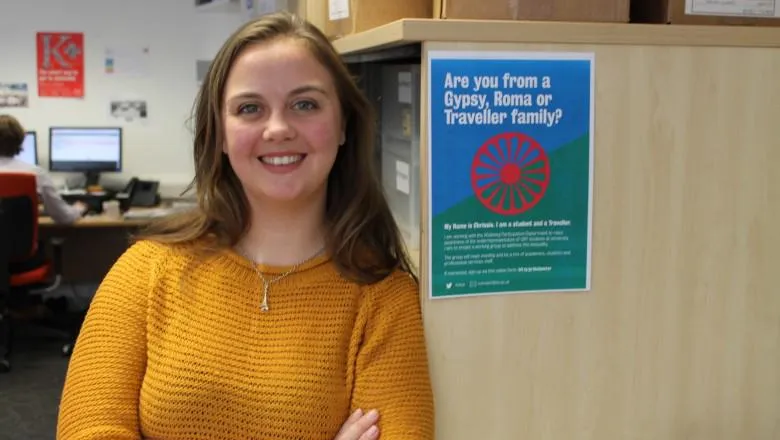We want to show that Rom, the Romani name for the Travelling people, belong as members of society. That we belong in any career we choose, becoming doctors, lawyers, teachers, historians, musicians and politicians. That we belong in academia. We want to show that Rom belong at King’s College London.
Chrissie Browne, Nutrition & Dietetics student and co-creator of RomBelong
05 May 2020
Providing bespoke support for Gypsy, Roma and Traveller students during COVID-19
Nutrition and Dietetics student Chrissie Browne tells us how the RomBelong programme has been adapted during the pandemic.

Gypsies, Roma and Travellers (commonly considered together under the umbrella term GRT) are amongst the least likely to go to university. They are also most likely to experience multiple types of deprivation, including lack of access to computers at home and parents who may be less able to provide homework support.
To increase progression to higher education among the GRT community, King’s Widening Participation Department launched the RomBelong programme in 2018. Due to the closure of schools and suspension of academic support programmes during the COVID-19 pandemic, GRT students require additional support to ensure they stay on track with their studies.
We spoke to Chrissie Browne, co-creator of RomBelong and final year Nutrition and Dietetics student at King’s, about how the programme has been adapted in response to the COVID-19 pandemic.
What is King’s doing to address inequalities among the GRT community?
As a King’s College London student and a Traveller, I know how alien universities can feel. That’s why I jumped at the chance to work with the Widening Participation Department on a project for young GRT people. Together with Chelsea McDonagh, another Traveller student at King’s who is studying for a master’s in Education, we created the RomBelong programme to engage with communities, schools, councils and charities to make education more accessible and university a place of belonging for GRT students.
It is estimated that 2-3% of Romany Gypsy, European Roma and Irish or Scottish Traveller students proceed to higher education, compared to 43% of the general population. King’s commissioned a report about the underrepresentation GRT students in higher education, which assessed the barriers these students experience and made several recommendations. This includes encouraging parents and pupils to identify their GRT status and offering reassurance that this will not result in discrimination, as well as acknowledging the additional supported required for home-educated pupils.
It is important to us that we work with people rather than for them, considering different cultures and barriers through our research, implementation and evaluation.
What does the RomBelong programme provide for the GRT community?
The programme aims to build positive role models by showing successful Gypsy, Roma and Traveller students, prioritising GRT students and running targeted activities and programmes across different ages (from primary school upwards) so they know their choices and rights in education.
We also created six short films last summer to show first-hand experiences of GRT students at university. These have been shared far and wide, including with councils and educators to use with the people they engage with.
How have you adapted the RomBelong programme in response to COVID-19?
As most of our work is face-to-face in schools or on King’s campuses, all our events have been cancelled for this academic year. But we still wanted to provide support for the students. Knowing that GRT students are more likely to experience digital exclusion and less likely to have help with homework, we thought the best way to help was to offer phone-based tutoring. We have collaborated with The Traveller Movement on their project to provide bespoke 1-2-1 tutoring for GRT families and have helped 10 families so far.
Every tutor is matched individually to help with the needs of the family, using whatever technology they have access to. Where possible, tutors support with work that the school has sent home. If the family cannot access this work or the student has finished what they have been set, we provide workbooks to help students continue learning.
We had to get this adapted programme up and running pretty quickly as the longer these students go without support the easier it is for them to fall behind. We are indebted to Traveller Movement’s volunteer tutors for offering this invaluable service.
What’s next for Rombelong?
Although this programme has been adapted in response to COVID-19, the long-term implications of a phone- or online-based tutoring service for GRT students is exciting. We can reach further, help more people and do so in a meaningful and sustainable way. In the last month we have seen a spike in engagement, with more parents, schools and individuals getting in touch with us since we launched in 2018.
If you’re a student from a GRT background and want some guidance or are interested in getting involved in the RomBelong programme, please email outreach@kcl.ac.uk
